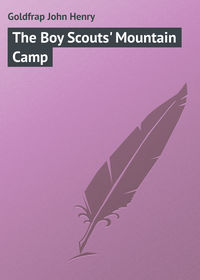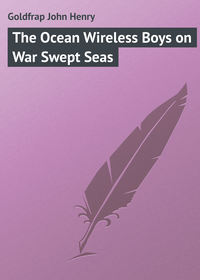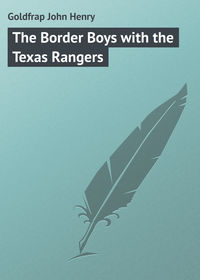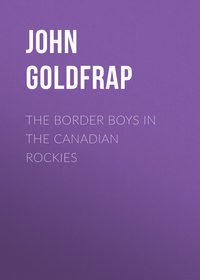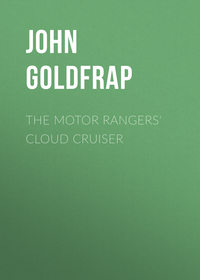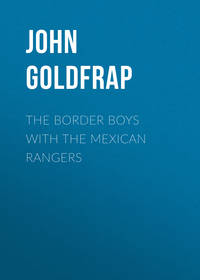 полная версия
полная версияThe Boy Aviators in Nicaragua; or, In League with the Insurgents
“Our engine is fifty horsepower of what is known as the opposed type and every bit of it made in an American shop. It ‘turns up’ twelve hundred revolutions a minute. We rarely run it that speed, however. The gasolene and the water for cooling the cylinder jackets are suspended in tanks under the deck-house. A pump circulates the water through the cylinder jackets and into a condenser where it is cooled off and is ready to be forced through the cylinders again. The lubricating oil is fed also by a force system which is much more reliable than the gravity method particularly in an air-ship where there is a tendency to pitch about a lot in the upper air currents.
“The frames upon which the covering of the planes is stretched are formed of an alloy of aluminum and bronze which makes an exceptionally light and strong material for the purpose. We put a few ideas of our own into the Golden Eagle when we built her, among them being an improved bird-like tail which makes her handle very readily even in heavy weather.
“And – Oh, yes, I almost forgot the wireless plant. That is really the most unique feature of our craft. We carry our aerials, as the long receiving wires are called, stretched across the whole length of the upper plane and the receiving and sending apparatus is right handy to the operator’s right hand. We have a double steering wheel fitted tandem, so that anyone sitting behind the operator can handle the rudder while he is busy at the wireless.
“In the pilot-house, as we call it, but it is really more a sort of cockpit in the deck-house, are fitted small watertight mahogany boxes which contain our navigating instruments and we have a brass binnacle boxing in a spirit compass which is lighted at night by the current from a miniature dynamo which also supplies power for a small but powerful searchlight.
“Then there is the ration basket. It weighs but fifty pounds full, but it carries enough provisions for three persons for five days. In it also are three pairs of thin blankets made of a very light but warm weave of material and a water-filter. It contains, too, some medicines and bandages and lotions in case we have a smash-up. So you see,” concluded Frank with a laugh, “we have a pretty complete sort of a craft.”
After good-byes had been said to the Aztec’s captain and a few of their fellow-passengers who still remained on board, and the last of the dozen cases containing the Golden Eagle had been lowered into the lighter, the little party descended the Jacob’s Ladder and took their places in the bonga. While they had been on board one of the brown-skinned fishermen who manned her had rigged up a sort of awning astern with a spare sail, and this gave the voyagers a welcome bit of shade. With a cheer from the boys her crew shoved off and the bonga heeling to the breeze headed for the palm-fringed shore.
“About time they put about and ran up to the wharf, isn’t it?” asked Harry as the bonga scudded along so close to the shore that the roar of the heavy surf as the big waves broke on the yellow beach could be distinctly heard.
“Here’s where you are going to get a new experience,” laughed Mr. Chester, “I want to see whether such bold air sailors as you boys can stand shooting the surf without being scared.”
“You don’t mean to say that we are going to land on the beach?” gasped Harry.
“That’s just what I do,” cheerfully replied his father. “In a few minutes you’ll see something that will show you that all the wonders of the world aren’t monopolized by New York.”
The men in the bonga were lowering the sails as he spoke and when they had them tied in gaskets each took an oar while the captain ran to the stern with a long sweep.
The men rowed slowly toward the shore till they were almost hurled bow on into the tumbling surf. Suddenly, at a cry from the man in the stern, they stopped work with their oars and the bonga tossed up and down on the racing crests of the big waves while they “backwatered.”
All at once the man with the steering oar, who had been watching for a large wave to come rolling along, gave a loud command. The rowers fell furiously to work. The boys felt the bonga lifted up and up on the crest of the big combers and a second later they were swept forward, it seemed at a rate of sixty miles an hour. The surf broke all about the bonga, but she hardly shipped a drop.
As the long narrow craft raced into the boiling smother of white foam her crew leaped out in water almost up to their necks and fairly rushed the craft up the beach before the next roller came crashing in.
“Well, that beats shooting the chutes, for taking your breath away,” remarked Harry as the party strolled along under a palm-bordered avenue on their way to the hotel where they were to lunch. The dripping crew of the bonga followed them carrying the boys’ smart, new baggage on their heads.
The Hotel Grand Central was a long building with a red-tiled roof and the invariable patio in the center off which the room opened. The boys were delighted with the place. In the middle of the patio, in a grove of tropical plants, a cool fountain plashed and several gaudy macaws were clambering about in the branches of the glistening greenery. The hot dusty street outside with its glaring sun and blazing iron roofs seemed miles away.
As they were about to turn into the sala, in which their meal was to be served, a man bustled out and almost collided with them. It was General Rogero.
“Ah, Señor, we seem fated to encounter each other to-day,” he exclaimed with a flash of irritation as his eyes met Mr. Chester’s.
The next moment he had started back with a quick: “peste!” as his dark gaze fell on the boys.
“Why!” exclaimed Harry, “that’s the fellow who came down on the ship. The man who said he was a diamond salesman and that he had a lot of stones in that black bag! Do you know him, father?”
“Know him?” repeated Mr. Chester in a puzzled tone as Rogero whisked scowling out of sight into an adjoining room.
“He was a mysterious sort of cuss,” chimed in Frank, “kept to himself all the way down and had his meals in his cabin.”
“Perhaps he had a good reason to,” smiled Mr. Chester; “your diamond salesman is General Rogero of the president’s army.”
As he spoke and the two boys fairly gasped in astonishment at this sudden revelation of the true character of the man with the black bag, Billy Barnes came hurrying up.
“Hello, my fellow-passengers,” he exclaimed heartily; “hello, Frank! hello, Harry!” – it was characteristic of Mr. Barnes, that although he had met the boys for the first time on the steamer he was calling them by their first names the second day out – “as I hinted to your father an hour or so ago, I’ve run into the biggest story of my career.”
“You rushed off in such a hurry that I could hardly call it even a hint,” smiled Mr. Chester.
“You’ll get jolly well laid up, Mr. Barnes, if you go rushing about like that in this climate – what?” put in Blakely.
“I beg your pardon, sir, really,” burst out the impulsive Billy contritely, addressing Mr. Chester, “but you know when a newspaper man gets on the track of a good story he sometimes forgets his manners. But you will be interested in my morning’s work.”
“Here’s what I’m digging on and if it isn’t a snorter of a story never let me see New York again.”
“Well, what is it, Billy?” asked Harry, “come on, never mind the fireworks – let’s have it.”
“Just this;” proudly announced the reporter, “General Rogero has only two fingers on his right hand.”
“Yes?” from the boys in puzzled tones.
“Well, what of it?” from Mr. Chester.
Billy was evidently artist enough to keep his listeners in suspense for he went on with great deliberation.
“You remember that when he was ‘a diamond salesman,’ on board the Aztec that we hardly ever saw him? – well, there was a reason, as the advertising men say. What was that reason? you ask me. Just this; that he didn’t want any one to get wise that he was minus three of his precious digits.
“Why for? – Because the man who killed Dr. Moneague in New York, was shy on his hands in the same way – now do you see!” triumphantly demanded the reporter.
“If our amiable friend Rogero isn’t the same man who murdered Moneague in New York I’ll eat my camera, films and all,” he concluded.
“It doesn’t seem to me that you have any proof on which you can base such a serious accusation,” said Mr. Chester. “Rogero is a desperate man and an unscrupulous one, but I do not believe that even he would deliberately commit such a crime.”
“Don’t you, sir?” contradicted Billy, “well, I do. From what I’ve observed of him, he’d stop at nothing if he had an end to gain. The thing in this case though is, what was his motive for killing Dr. Moneague, except that Moneague, so the police discovered, was an agent of the revolutionists down here?”
Like a flash the recollection of what Don Pachecho had told him about the bit of parchment on which was traced the secret of the lost Toltec mines crossed Mr. Chester’s mind. He hurriedly gave his interested auditors an outline of what he knew about the clue to the treasure trove.
“Rogero’s the man then for twenty dollars!” excitedly cried Billy. “He had the thing in that black bag he guarded so carefully. If I only could get hold of it we’d have his neck in the halter in a brace of shakes. I’ve a good mind to try. The first thing I’m going to do, though, is to flash a bit of message to New York – to No. 300 Mulberry Street – and tell my old friend Detective Lieutenant Connolly that I think a run down here would result in his turning up something interesting. Anyhow – ,” the reporter was continuing, when he was cut short by the sound of a shot from outside and a loud cry of pain. The startled party hurried through the sala and out into the street.
“A shot means a story;” remarked Billy to his camera as he adjusted it ready for action while he hurried along after the others.
CHAPTER V.
ROGERO IS CHECKMATED
In front of the hotel an excited crowd was clustered about a man who lay in the dust. He was evidently badly wounded if not dead. Near by, a sneer on his evil face, stood Rogero, his still smoking pistol in his hand. As Mr. Chester and the boys hurried up he turned to them and exclaimed:
“You see, Señor, that it is not safe to be a revolutionist in these days.”
“Why it’s poor Juan!” cried Mr. Chester as he bent over the man who had been shot. “Good God, he’s dead!” he exclaimed a second later after a brief examination of the prostrate figure.
“Yes; one of your servants I believe,” remarked Rogero carelessly, “the dog was pointed out to me as being a runaway from Estrada’s army and, when I called him to me to give him a little wholesome advice, he started to run off so I was compelled in the interests of discipline to shoot him.”
There was no more emotion in his voice than if he had been speaking of some ordinary event of life.
“This is a coward’s trick!” exclaimed Mr. Chester angrily, “this man was my servant and any complaint you had against him you should have referred to me.”
Rogero lightly flicked some ash off the cigarette he was smoking.
“I should be more temperate in my language, Señor, if I were you,” he said.
“I am an American citizen, sir,” replied Mr. Chester; “the flag of my country floats over that consulate.” He pointed to a neat, verandered building a few blocks away. “I shall see that you are made to answer for this wanton crime.”
“I am afraid that you will have to defer such action for the present,” sneered Rogero, as a file of ragged Nicaraguan soldiers came running from the barracks and, after saluting him respectfully, fell in behind him with fixed bayonets.
“This city is under martial law and I should advise you to be circumspect in your behavior. A suspected insurgent sympathizer is on dangerous ground in these days.”
“By the way,” he went on viciously, “I am afraid that I shall have to interdict the orders you have given to have that celebrated air-ship,” – there was a bitter irony in his tones that made the boys clinch their fists, “conveyed to your hacienda. I am of the opinion that air-ships in the hands of revolutionists sympathizers come under the head of contraband of war and I intend to have this particular one destroyed.”
The effect on Harry and Frank of these words was magical. The elder brother sprang angrily forward although his father and Blakely tried to hold him back.
“You mean you would dare to destroy the property of non-combatant American citizens?” he demanded, his blood aboil.
“I don’t talk to boys,” was Rogero’s contemptuous reply.
“Well, you’ll have to talk to us,” angrily chimed in Harry coming forward, “if you put a finger on the Golden Eagle, or harm her in any way you will find that the United States’ government resents any insult or injury to her citizens in a way that you will remember.”
So excited were the boys at the dastardly threat of Rogero, and so thunderstruck were their father and Blakely at the man’s brutal arrogance that none of them had noticed Billy Barnes who had been standing behind the party. Now he stepped up, with his camera, bellows pulled out and ready for action. Rogero was standing defiantly, his hand on his sword-hilt. For the first time the boys saw his right hand.
There were two fingers missing!
“Just hold that pose for a second, General,” exclaimed Billy, his finger on the button of his machine. Rogero turned with a snarl as the button clicked and his image was irrevocably fixed on the film.
“It will be a beautiful picture,” remarked Billy amiably. “You see the light was very good and the lamentable fact that you are shy two fingers will be clearly shown, I hope, in the print I intend to make at the earliest opportunity.”
“You dog of a newspaper spy,” snarled Rogero, his face a pasty yellow and fear in his eyes, “I know you. You are a sneaking reporter. We don’t like such renegades as you in my country. We have a way of dealing with them, however, that usually causes them to cease from troubling us.”
He raised his hand to his throat and gave an unpleasant sort of an imitation of the “garrotte” which is the instrument of execution in most Latin-American countries.
“And we in the States have also got a way of dealing with men like you,” said Billy meaningly. “Now,” he went on in a low voice, stepping close to Rogero, “if you harm that aeroplane in any way I’ll forward the picture, I just took to Detective Connolly of the New York Central Office, and I think he can have a very interesting time with it tracing your movements in New York before the murder of Dr. Moneague!”
If he had been struck full in the face the effect on Rogero could not have been more magical. He opened his dried lips as if to speak, but no sound came. In his eyes there was a hunted look.
“I’ll have you – ,” he began when he at last found his voice.
“You’ll have nothing,” replied Billy cheerfully, “because you don’t dare. Now, then; tell these boys they can have their aeroplane unharmed. Write them an order – here’s my pad and a fountain pen – don’t forget to give them back.”
Rogero snarled like a cornered tiger, but he took the pen and scrawled a passport in Spanish on Billy’s pad.
“Take your wonderful flying machine then, and I only hope you break your necks,” he muttered. With an evil look at Billy which did not at all seem to worry that amiable young gentleman who merely winked knowingly in reply, he turned on his heel and strode off followed by his soldiers.
“By Jove, you American pressmen have a high-handed way of doing things, I must say,” remarked Blakely. The boys, too, were much delighted and amused and congratulated Billy warmly on his successful bit of strategy. Mr. Chester, however, by no means took the matter so lightly. After he had given orders that the body of the unfortunate Juan be properly cared for and sent back to La Merced for burial, he turned to young Barnes.
“My boy,” he said, “we are not in America now, and in the present state of the country Rogero can be a very dangerous man.”
“He ought to be shot,” indignantly cried Harry.
“Or hanged,” put in Frank.
“Both,” concluded Billy, with conviction.
“Perhaps,” said Mr. Chester, as he headed the little group into the hotel once more, “but in Nicaragua the law of might prevails and that man means mischief.”
As he uttered the last words in a grave tone there came a rattle of hoofs far down the street, and the next minute a horseman flashed by the hotel in a cloud of yellow dust. He spurred his horse desperately up to the barracks and, as he drew rein, Mr. Chester and the boys saw Rogero come out on the balcony and the messenger standing in his stirrups, hand him an envelope.
“News from the front,” commented Mr. Chester. Rogero disappeared for a few minutes and when he came out again he handed the messenger another envelope, evidently containing a reply to the despatch he had just received. The man wheeled his horse almost on its haunches and spurred down the street again.
“What is it?” shouted Mr. Chester in Spanish to him as he dashed by the hotel riding as if his life depended on speed.
“Another great victory,” he shouted reining his sweating horse in for an imperceptible fragment of time.
As the clatter of his horse’s hoofs died away in the direction of the mountains there was a great commotion in the barracks. Bugles sounded and men ran about with horses, arms and bundles, in the confusion that characterizes improperly-disciplined troops. After about half an hour of this frenzied preparation the troops, some two hundred in number, with Rogero and his dark-skinned staff officers at their head with the blue and white “colors”; fell awkwardly in line and to the music of a crazy band with battered, dirty instruments began their march to the front.
Their way led by the hotel where the boys stood gazing with amusement and some pity at their first sight of a Central American army on the march. Some of the troopers were not much bigger than the newsboys they had left behind in the New York that now seemed so far away. These little fellows tottered along under the weight of haversacks and heavy Remington rifles, keeping step as best they could with their elders. Several of the soldiers carried gamecocks under their arms and others had guitars and mandolins slung over their shoulders; one man even carried a bird in a wooden cage.
Rogero’s face bore a deep scowl as he rode by surrounded by his excited staff officers. His eyes were downcast but he raised them as he passed the little group in front of the Grand Central. There was a sinister gleam in them like that in the leaden orbs of a venomous serpent.
“Adios, señors,” he sneered, leaning back in his saddle, “we shall meet again and I shall have the pleasure, I hope, of introducing some of you to our Nicaraguan prisons.”
CHAPTER VI.
FRANK TO THE RESCUE
Wagons for the transportation of the packing cases containing the Golden Eagle, and for the boys’ baggage had been secured by old Matula earlier in the day and when the Chester party arrived at the wharf, late in the afternoon, he had made such an impression on the native workers by his imperious commands and promises of extra money from the Señor Chester for fast work, that they found everything in readiness for the journey back to the plantation. The boys were delighted with their ponies, spirited little animals as quick as cats on their feet and able to travel over the rough mountain roads like goats.
The wagon was drawn by a team of bullocks hitched to the pole by a heavy yoke of wood, with the rough marks of the axe still upon it.
“Well, we really are in a foreign country at last,” exclaimed Harry as his eyes fell on the primitive-looking wagon and its queer motive power.
In spite of old Matula’s by turns imploring, threatening and wheedling persuasions it was almost dark when the expedition was ready to make a start for the plantation. There was a full moon, however, and the moonlight of the tropics in the dry season is a very different thing to the pallid illumination of the northern Luna. As the Chester party, headed by the boys on their ponies, wound through the streets of Greytown and began the long steady climb to La Merced, a radiance like electric light flooded the way and showed them every twig and leaf as clearly as if it had been day. Everywhere, too, the darker shadows were spangled with brilliant fireflies.
They reached the plantation about midnight and found that the servants had made everything ready for their reception. The boys were delighted with the picturesque reception the hands gave them. Every man, woman and child had a torch and the sight of these flickering about in the moonlight long before they reached their destination resembled a convention of huge lightning-bugs.
Inside the main sala there was a tempting meal in the native style laid out. There was huge grapefruit and custard apples, a fruit filled with real custard, crisp bread-fruit roasted to a turn, fragrant frijoles, the national dish of the Latin-American from Mexico to Patagonia, and several kinds of meat and salted fish all cooked in the best style of old Matula’s wife, who waited on them.
“Well, this beats Delmonico’s,” remarked Billy, who at Mr. Chester’s hearty invitation had made one of the party. “I always had an idea that you people down here lived like savages,” he laughed, “but here you are with a layout that you couldn’t beat anywhere from New York to the coast.”
Billy’s simple-hearted admiration of everything he had encountered on the estancia caused Mr. Chester much amusement. Billy proved his appreciation of everything by sampling all the dishes in turn including a dish of red peppers that caused his temporary retirement in agony.
“Jimminy crickets, I felt as if I had a three alarm fire in my department of the interior,” was the way he explained his feelings after he had swallowed a gallon of water, more or less, to alleviate his sufferings.
After their exciting day the boys slept like tops, although their dreams were a wild rehash of the novel experiences they had gone through. Frank dreamed that Rogero in an airship fashioned like a bonga was pursuing them through space and that although they speeded up the Golden Eagle to her fastest flight, the evil-faced Nicaraguan gained on them rapidly. He had just run the prow of his queer air-craft into the Golden Eagle’s stern and Frank felt himself falling, falling down into a huge sort of lake of boiling surf when he awoke to find it was broad daylight, and the cheerful daily routine of the plantation going busily on as if the events of the day before had been as unreal as his dream. Springing out of bed, Frank aroused Harry. The younger boy had just about rubbed the sleep out of his eyes when their father came into the room.
“Come on boys,” he said, “and I’ll show you how we take our morning bath down here.”
The boys slipped on bath-robes and thrust their feet into slippers. When they were ready Mr. Chester led them out to a small building with latticed sides a short distance from the house. Inside was a cement-lined pool about twenty feet in length by fifteen in width with a depth that varied from five feet at one end to seven at the other. It was full of sparkling water that ran into it from a mountain stream on one side, and was piped back into the bed of the brook, again after it had flowed through Mr. Chester’s unique bathroom.
With a loud whoop Harry was just about to jump into the inviting looking bathing-place when Mr. Chester stopped him.
“Look before you leap, Harry,” he cautioned, “every once in a while a tarantula or a snake or a nice fat scorpion takes a fancy to a bath, and tumbles in here and they are not pleasant companions at close range.”
An investigation showed, however, that there were none of the unpleasant intruders Mr. Chester had mentioned in the bath that morning, at least, and the two boys swam about to their hearts’ content, and after dressing came in for breakfast as delightful as their meal of the previous night in its novelty and variety.
Breakfast despatched of course the first thing to do was to superintend the unpacking of the Golden Eagle. The bullock cart had been taken down to a cleared spot not far removed from the barracks of the laborers, and a squad of brown-skinned men were already at work when Frank and Harry strolled down there setting up a sort of shelter, thatched with palm leaves under which the boys might work without being in danger of sunstroke.


